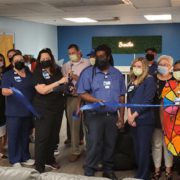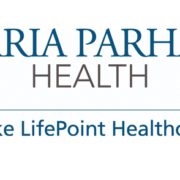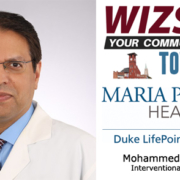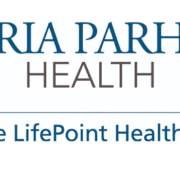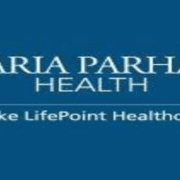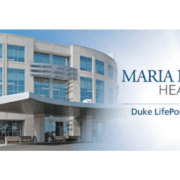It is generally not recommended for pedestrians to walk out in the middle of traffic for any reason – especially Dabney Drive. But when firefighters do it, with their boots in their hands instead of on their feet, rest assured it’s for a good cause.
And on Tuesday, Henderson Fire Chief Steve Cordell presented the result of the 2021 fundraiser to the staff at Maria Parham Health’s Cancer Center – a check for $25,000. WIZS’s Trey Snide was on hand Tuesday for the check presentation and John C. Rose shared highlights on Wednesday’s Town Talk.
“It’s a great honor for us to be here with you today to present you with another donation from the wonderful residents of the city of Henderson and Vance County and the visitors that come down Dabney Drive,” Cordell said during the presentation ceremony.
He recounted that the first fundraiser to support the cancer center’s “angel fund” was back in 2014. Through t-shirt sales to fight breast cancer, the fire department was able to raise about $3,400 for the oncology department.
Since then, the annual fundraiser – except for last year when it was cancelled because of the pandemic – has netted more than $77,000.
This year’s total of $25,000 almost doubles the combined efforts of previous fundraisers, and Cordell credits the generosity of the community and the willingness of all three shifts of firefighters with this year’s success.
“This year’s total – I was blown away,” he told the group assembled at the hospital for the presentation. The original goal for Day 1 of the project was $4,700, but they’d gotten that by lunchtime, Cordell recalled. By the end of Day 1, folks had put $11,000 in those boots.
Cordell said he remembered thinking, “Man, that’s good. The rest of the days will be pretty slow, but the people just kept on giving.”
“If it wasn’t for these men and women that go out there, very unselfishly, and stand out there in the middle of Dabney Drive and hold a boot,” Cordell said, the donation to the cancer center simply wouldn’t have been possible.
Kimberly Smith is director of the hospital’s cancer center and she said the angel fund helps cancer patients with basic needs, from transportation to medicines to help with their treatment.
“We thank you very much,” Smith said. “We appreciate you…this money will go to great use for our patients and our community here.”
She likened the work of firefighters to the work that the staff at the cancer center, saying that every day, each group of workers does an amazing job and, every day, they find ways to help people in the communities they serve.
Hope Breedlove is a social worker at the cancer center and offered her thanks as well.
“I’m so thankful. I’m so proud right now of you, of the community.” Through the angel fund, patients can receive funds that remove barriers, Breedlove noted, and if it weren’t for the angel fund, “we couldn’t do some of the things that we’re able to do” for the patients.
“This angel fund is truly a godsend,” Breedlove said. “From the bottom of my heart, from the bottom of our hearts, and from the bottom of our patients’ hearts, we just thank you so much.”
Click Play


